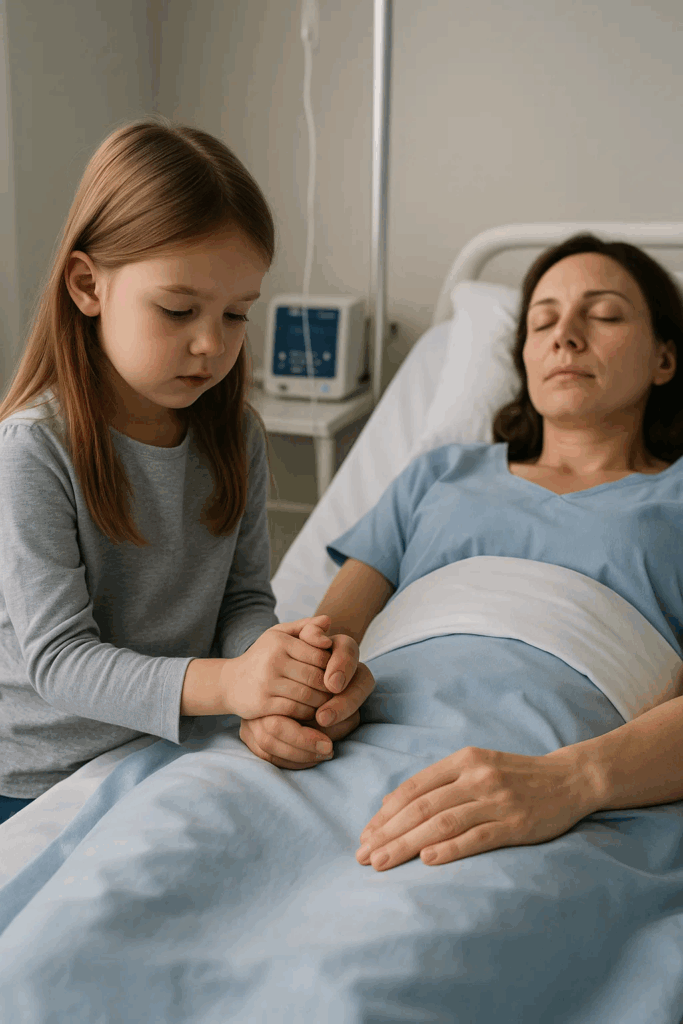She Had Only Days to Live — Until a Little Girl Came In and Asked the Unthinkable
They didn’t expect her to make it through the night.
In the blindingly bright intensive care unit, Alla drifted in and out of consciousness. The steady rhythm of the machines marked time, but she felt untethered—neither fully present in the world nor entirely gone.
A voice, strained and distant, cut through the quiet.
“Allochka, please… stay.”

It was Kolya. His voice, so familiar, now sounded weary. Was it love? Or just guilt?
Then, nothing. Only the peaceful emptiness of surrender.
But life has a stubborn will. It clings, even when we wish it wouldn’t.
Alla’s awareness flickered back in fragments. A ceiling tile. The sharp smell of antiseptic. The weight of her own body. Then, soft footsteps. Little ones.
A child stood by her bedside.
She couldn’t have been older than six. Her hair was a mess, her eyes uncertain.
“I’m Katya,” she announced plainly. “Are you dead?”
Alla’s lips parted. A whisper escaped.
“Not yet.”
“Good,” the girl nodded, a serious expression on her face. “Because dying is boring.”
She settled into the chair as if she owned the place.
Katya spoke with a wisdom beyond her years—of a mother who had disappeared, of a grandmother who cooked but rarely spoke, of a kindergarten filled with “liars and crybabies.”
Alla listened. Truly listened. For the first time in ages, something stirred in her chest—not pain, but a deep longing.
Before Katya left, she turned back.
“I’ll be here tomorrow. Don’t die, okay?”
And then, she was gone.
The doctor, Yuri Anatolyevich, was kind. Serious, but not cold. He offered no false hope.
“You’re fighting,” he told her. “Your body is exhausted, but it’s not giving up.”
She wanted to ask about Kolya, but Yuri answered the unspoken question.
“He left. A while ago.”
There was no surprise. Just a dull ache where love had once resided.
“You still have a chance to live, Alla. But you need a reason to.”
She thought of the little girl. Katya.
That evening, the child returned, just as she promised.
“Do you have kids?” Katya asked, her fingers tracing invisible patterns on the windowsill.
Alla shook her head. “I wanted to. It just never happened.”
Katya nodded solemnly.
“Then let’s pretend. You can be my mom, and I’ll be your kid. Just for now. Or longer.”
Alla’s throat tightened. A simple offer, born of pure innocence.
“Let’s,” she whispered.
Day by day, light seeped back into Alla’s body. Strength returned to her hands. Color to her cheeks. She even found herself laughing when Katya brought her silly drawings and wild stories.
Yuri noticed the change. So did the nurses.
But shadows still loomed.
The truth about Kolya emerged in fragments—odd bank transactions, missing money, whispers of betrayal. Then came the shocking revelation: her car accident wasn’t an accident at all. The brakes had been tampered with. Intentional damage. A husband who wanted her gone.
Yuri stood by her side as the detective explained everything.
“He was apprehended trying to board a plane. We have the evidence.”
No tears came. Just a steady breath.
She had nearly died. Not from illness, but from being utterly invisible in her own life.
But not anymore.
The weeks that followed felt like a gift—borrowed, yet profoundly earned.
Yuri visited more often. Katya, too. Her grandmother even brought soup one day and mumbled something that sounded like gratitude.
The ward changed. And so did Alla. She began to see herself not as someone simply recovering, but as someone transforming.
When the day of her discharge arrived, she stepped outside, Yuri holding one hand, Katya the other.
“Come live with us,” Katya declared. “You’re ours now.”
A gentle breeze stirred Alla’s hair. The sun felt warm on her skin. Not dazzling—but enough.
Enough to begin again.
In a quiet house filled with children’s drawings, mismatched mugs, and soft voices, Alla finally found a home. A child who had been left behind. A doctor who was no longer a stranger. And a woman who had almost died, only to discover life—imperfect, unpredictable, and finally… her own.


